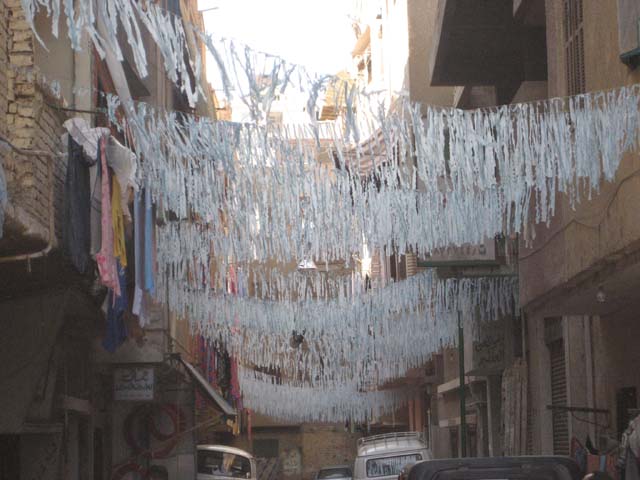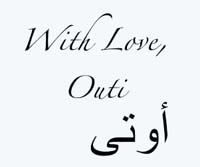
Greetings from Cairo part XIV
Published in Ishtar 5/2009

Ramadan – the Month of God
translated by Anu Toivonen
The annual season of Ramadan has just passed, so perhaps it is time to take a look at the balance and see if it will find favour in God’s eyes. Even though Allah is present in a Muslim’s everyday life, the month of Ramadan is particularly dedicated to God. People are expected to especially approach their Creator and live closely according to His wishes.
Ramadan is the ninth month in the Islamic calendar and as this calendar is lunar, the year is 11 days shorter than the western year. For this reason, Ramadan moves almost two weeks forward every year according to our calendar. Ramadan will begin when the sickle of the new moon is just discernible in the sky. Even though this date is approximately known every year, the exact day can be determined usually only the previous evening. The end of Ramadan is similarly determined. Ramadan lasts for 29-30 days and the exact moment of its termination can be determined the previous evening. Two previous months may give an idea, however: if the two preceding months were full (that is, if they had 30 days) Ramadan will probably be shorter. If, however, these months were short, Ramadan will in all likelihood be longer.
Striving during the fast
Fasting is one of the five Pillars of Islam. Some people fast once or twice a week, mostly on Mondays and Thursdays, all the year round but even the most secularised Muslim finds the devout believer within during Ramadan. According to the prophet Mohammed, the fasting begins at sunrise when it is possible to distinguish between a black and a white thread. Likewise, the days fasting ends whet this difference is no longer apparent. Today, the prayer-calls sounding from the mosque announce the beginning and end to the fasting.
Fasting means abstinence. During the day, the people do not eat, drink, smoke or put anything else in their mouth – the most devout do not even swallow their spit. The Saudi Arabian women do not wear any make-up during the day, or if they do they leave out the lipstick because of the animal fats contained in them, as some lipstick will always enter the system from the lips.
Fasting also includes refraining from all profane language, all vice, impure thoughts and sexual intercourse. Because of this, the Egyptians - even Christians - are not allowed any alcoholic beverage in the restaurants during Ramadan. Night Clubs, Cabarets and shops selling alcoholic beverage are closed during Ramadan, and all dance performances are banned. Ramadan is, traditionally, the month of the dancers’ vacation.
What you learn when young…
The children learn fasting little by little; first a few hours a day for a few days, then gradually increasing both the number of days and hours until they are able to fast all through Ramadan. When the children will start learning and how quickly they will be able to hold a complete fast will depend on the family’s devoutness, living place and the children’s gender: boys will generally start a little earlier than girls, and in the country where the people are under more intense scrutiny by their neighbours and the customs more homogenous the children tend to start fasting younger.
The fact that Ramadan keeps moving through the seasons affects the time when the children learn to fast. Hunger will cause problems in the winter, whereas in the summer’s heat problems are caused by thirst. As humans can tolerate hunger far better than thirst, the Ramadan occurring during the hot season may postpone the beginning of the children’s fasting by a year or two. The children start to learn to fast when 5-8 years old and hold the full fast at the age of 7-10.The adults in the family may encourage the children’s fast with bribes, or by playfully teasing them; there are Islamic rhymes and sayings encouraging the fast and at the same time threatening with a black dog those who are not fasting. The children are also encouraged to fast by the fasting and teasing of their friends.
Forbidden
Even though fasting is an integral part of Islam, God will take human imperfection into account: small children, those with a medical condition as well as pregnant or breastfeeding women are not expected to fast. A person is not allowed to harm him/herself or others by fasting.
In the past, travelling was far more difficult. The distances were long, and travelling was done by walking on foot or by riding in the hot sun. For this reason also travellers were considered to be exempt from the fast. Today the cars, ships and airplanes have made travelling so easy that many Muslims hold a normal fast regardless.
Also menstruating women are exempt from fasting, however, they are expected to make up for the missing fast later.
For those used to fasting, it seems to be a greater problem not holding the fast, so many people do not break their fast even if they in fact ought to do so. Many breastfeeding women fast normally during the day, but take extra care to drink a lot during the evening and night. A person suffering of the migraine may not want to take the medicine with water and consequently, will try to swallow it without any liquid. As taking the medicine is already in itself against Islam, and as taking it without water may be harmful, this action is not likely to follow Islam. In this case, it would probably be better to take the medicine in time and with an ample amount of water and then make up for the missed day afterwards.
Near to God
God gave eleven months to the Muslims to live their own lives but asked them to give Ramadan to Him. This is how Muslims see Ramadan.
During Ramadan, the Muslims do everything in their power to live according to the will of God. In the metro, many keep reading the Quran and during the past few years, you have also been able to hear Quranic verses recorded on the mobile phones. Many Muslims also aim to read through the Quran during Ramadan. Praying increases, and many of those who do not normally pray at all, do so the required five times a day during Ramadan.
One sign of God’s mercy is reflected in the prayer requirements: if you can’t physically pray in the normal way – kneeling on the floor – you may do so sitting down. If you can’t sit, you may pray turning your head. If even that is impossible, praying by turning your eyes is enough. Therefore, it is futile referring to physical condition if you have been missing your prayers.
One reason for the fasting is to make you realise that there are people who are less fortunate: fasting will remind you of what it is like to be hungry or thirsty. During Ramadan, it is your duty to give alms to the poor and for charity. The beggars also grow more aggressive during Ramadan and as many people give money as alms, the beggars simply do not accept a refusal. Wealthy citizens give food to the poor. Some people have their own special place in the city, where they provide a free breakfast – the first meal of the day at sunset - and some donate money to a mosque that will provide a similar meal. The people are expected to treat each other in an exceptionally friendly and considerate way during Ramadan.
In the real life
In the country, Ramadan does not greatly alter the normal daily rhythm of life as the animals must be tended and the farm work done as usual. The people may wake up a little earlier, rest a little longer during mid-day and continue working a little longer in the evening, that is all.
It is different in the city. The government employees may have a week off and if possible, the officials will start working a couple of hours later while leaving at the normal time. The offices will only be open in the mornings, at 9 am to 1 pm, depending on the office, so the effects of the shortened working hours will be evident right away. Some shops stay closed in the mornings and some shops selling clothes and household appliances expect their first customers only in the evening, after breakfast. The restaurants and shops selling fast food also stay closed during the day, as there would not be enough customers anyway. During the last week of fasting, I happened to see two open groceries quite side by side. I was very surprised until I realised they were situated close to a big hospital: the requirements of fasting do, naturally, not apply to the hospital’s patients.
In the autumn, as it did this year, Ramadan will also affect the start of the school year which is flexibly adjusted according to the end of Ramadan. Likewise, Egypt turned the clocks back to normal time after the summer right before Ramadan, long before the rest of the world.
At home, the days are spent with food. The women plan and prepare the food that is to be ready when the prayer call is heard. Glasses are filled with drinks and water is put in the fridge to cool hours before. Otherwise, the day is spent dozing and waiting for the evening. For a whole month, the country seems to run on idle during the day and nothing seems to move forward. The people sleep during the day as this makes fasting easier and there is no time for it later as the evening is filled with action.
Evening rush
The first breakfast of Ramadan, Iftar, is eaten at home with the own family but the following evenings are spent visiting close relatives. It is important to visit both maternal and paternal relatives.
The breakfast always follows the same pattern: sweet drinks are served first - traditionally dates, figs raisins and other sweet fruit dissolved in water. Lately, tamr hindi –juice has become more common as it is easy to buy from the shop at the last minute and requires no preparations before serving. The table is filled to overflowing with food. The varieties are the same as always but during Ramadan, everything is there at once: meat, chicken, duck, okra, potatoes, rice and soup. The dessert is always sweet, and there is a special treat prepared only during Ramadan: the ataif –pies. Unsalted little crepes are ready bought and filled with raisins, nuts and coconut flakes. These half-circle shaped pies are then deep fried and covered with sugared water. Ataif are not favoured by those counting the calories but they taste delicious. There are also kunafa and other sweet delicacies, and later various fruits. People drink a lot of water, fruit juices and tea. A juice prepared of apricots, amar el-din, is only served during Ramadan.
After the obligatory family visits it is time to draw breath. In the evenings, after the breakfast, there is special Ramadan programme on the television. Every year various entertainment series are recorded, and these are broadcast primetime. Every channel is competing for viewers and trying to outdo the others. Some of these programmes are packages full of situation comedy, music, folk dances and other colourful entertainment whereas some rely on famous actors and build the whole show around them. The programmes may also be soap operas with a complete story line and more than usual jokes and comic situations. It is normal to make a couple of extra episodes as you cannot be absolutely certain of the length of Ramadan so usually, these series last a few days longer.
The city is alive till dawn
Another form of post-meal entertainment includes hanging around town. The streets that were so empty before are now full of people, the shops are open and the rush can begin. People walk on the streets window shopping and popping in the shops. Families sit in the parks, on the bridges and squares to while the night away. There are concerts in the parks, often several going on at the same time in different park corners, folk dance groups and poets are entertaining the people and tannoura dancers are doing their best. Amidst all this, religious debates and Quran recitations are also organised.
The nights tend to grow long and many people never have time to sleep before suhur, the meal preceding dawn. Suhur consists of the usual breakfast ingredients, such as eggs, fuul paste made of beans, cheese and bread. Last, just before the prayer call, people drink a lot of water.
This year, the fasting began at 4 am, after which it was easy to sleep until noon. Many restaurants and nearly all the local fast food vendors are open until suhur and only after that, the last vendors and shops close the business to let the streets grow slowly quiet as the sun is rising.
Islamic fasting is a positive experience for the Muslims and the family union as well as the evening activities are pleasurable. People are expecting the beginning of Ramadan and all the special delicacies in advance and afterwards, they are sad because they miss the goodwill and happiness. In the evening’s joviality and joy they tend to forget all the little vexations and the short tempers caused by fasting. Despite the number of Christians, Egypt is an Islamic country and all Egyptians live Ramadan even if they do not fast themselves. Ramadan is in evidence everywhere: day and night, work and play.
Wishes of Ramadan:
Kullu sana wa inta taieb! (to a man)
Kullu sana wa inti taieba! (to a woman)
Kullu sana wa into taiebiin! (plural)
Literally translated these mean: ‘Whole year and you are good!’
Kullu = whole
sana = year
wa = and
inta/inti/into = you
taieb/taieba/taiebiin = good, kind; meaning that ‘somebody has a good heart’ or ‘somebody is a good person’.
This is an Egyptian expression to wish you well and it is used everywhere from birthdays to annual holidays and, of course, also at the beginning of Ramadan and at the end of it when ‘Id arrives.
A special Ramadan wish is Ramadan kareem! (Ramadan is generous!) for which the answer is Allahu akram! (God is more generous!).

|
